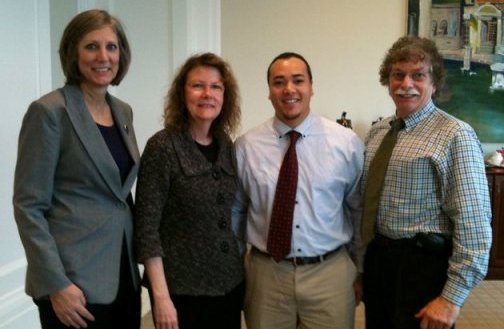College Site | Development | TOC - Department Dev Sites | CLHS TOC | Center for Law, Health & Society | News and Events | Center News | Medicine Meets Law: A Medical Student's Reflections Medicine Meets Law: A Medical Student's Reflections
March 22, 2011
By Paul Mello, 4th-year Morehouse Medical Student
ATLANTA - I began my 4th-year medical school elective rotation with the HeLP Legal Services Clinic by attending a HeLP Advisory Council meeting at a major Atlanta law firm. The Council members warmly welcomed me and immediately made me feel a part of the HeLP team, taking a photo for HeLP's Facebook page which featured me, standing shoulder-to-shoulder with my preceptors.
Later that morning, I met a smaller group of individuals and participated in case acceptance rounds. As we sat in a circle, it reminded me of a campfire chat. I was struck by the simplicity of the whole operation, as well as by the level of compassion and attention given to each case.
My role as an observer was cut short when I was asked to describe a rare genetic mutation called Prader Willi Syndrome to the rest of the group. I thought to myself, "Am I the designated medical expert? There's no attending physician to defer to?"
Even though I had never seen this condition and last read about it 6 months ago, I attempted to explain it. I started out by hedging. I was quickly called out, and had to step into my role as medical student. Only now I wasn't the student -- I was the educator.
I dug deep into my memory banks and managed to explain the process of genetic inheritance, genetic imprinting, and the ways this particular mutation places a child at a developmental risk. I was surprised that I hadn't lost anybody -- everyone was nodding in understanding. Wow, I had just consulted!
For the next month I would share an office with two law students. After introducing myself to my office mate, I quipped that I hoped she didn't end up suing me one day. My poor attempt at humor was answered with an earnest explanation about all of the positive ways that the HeLP Clinic could influence the medical-legal partnership with Children's Healthcare of Atlanta. It was clear that I had not fully appreciated the impact of my role there.
The purpose of this partnership is to dispel the pre-conceived notions that doctors and lawyers have about each other. Our relationship doesn't have to be adversarial. When it comes to patient and client care, we may often be on the same side. My time with the HeLP Clinic really made me understand that a collaborative effort between doctors and lawyers was possible because both unique skill sets are sometimes required to address the multiple determinants of health.
Over the next few weeks, I had the chance to observe mock trials, hearings, law clinic supervisory sessions, and to play the role of doctor and client in several educational workshops. I also ventured into the State Capitol several times as part of a health legislation and advocacy class. There I met representatives, senators, and lobbyists alike. I saw firsthand the intricate role that community partnerships have in influencing health policy and, for better or worse, the type of political capital that is necessary to effect change.
I was pleased to see one of the bills which the class had worked on clear several hurdles in the House and Senate during my rotation. This experience infected me with a certain sense of social and political responsibility. For the first time I really felt I grasped what it takes to go past the rhetoric. I might like a seat at the political decision-making table in the future.
Most importantly during my time with the HeLP Clinic, I met several new colleagues. I also developed a valuable perspective on health and how we address its numerous determinants. I'm sure the confidence, skills, and ideas that I gained while working with HeLP will make me well prepared to meet whatever challenges await me in a few short months, when I become a real doctor with a new set of responsibilities.